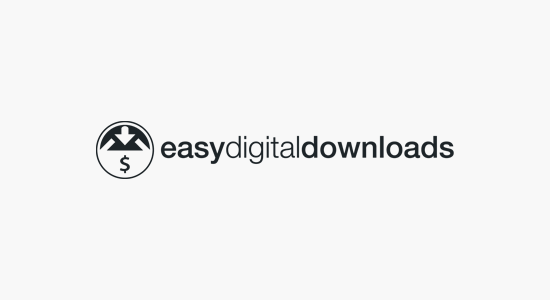
5 Best WordPress Ecommerce Plugins Compared – 2019
Are you looking to build an online store? Want to know which is the best WordPress eCommerce plugin?
Choosing the right eCommerce plugin is crucial for your business because a better platform means more opportunity for growth. Often users end up losing money because they didn’t do proper research when choosing the eCommerce platform to start their store.
In this article, we will compare the 5 best WordPress eCommerce plugins for 2019. We will also explain their pros and cons to help you find which eCommerce plugin is right for your business.

What to Look for in a WordPress eCommerce Plugin for Your Site?
There are plenty of WordPress eCommerce plugins in the market. But not all of them have the right set of features for your use-case.
For example, some eCommerce plugins are made for selling digital goods like eBooks, photos, music, etc. Others are better suited for selling physical products that need shipping.
If you want to run a drop-shipping business, then you’ll need an eCommerce solution that provides better support for drop-shipping.
Basically, you need to consider what you will be selling and what kind of features you would need to efficiently run your online store.
Apart from that, following are some of the most important factors you need to look for when choosing an eCommerce platform.
- Payment solutions – Your eCommerce plugin should have support for your preferred payment gateways by default or through an extension.
- Design and customization – Your store’s design is your customer’s first interaction with your business. Make sure there are plenty of templates and easy customization options available
- Apps and integrations – Check out integrations available for third-party apps like email marketing services, CRM software, accounting software, etc. You’ll need those tools to manage and grow your ecommerce business more effeciently.
- Support options – Make sure that there are support options available. Good support can save you a lot of money in the long run.
What Do You Need to Run an eCommerce Website?
Ecommerce websites are resource intensive, so the first thing you will need is the best WordPress hosting that you can afford.
If you’re on a budget, then you can start with Bluehost. The Ecommerce plan comes with SSL Certificate which you need to collect payments securely, dedicated IP, and a dedicated support line. They also install WooCommerce by default, which is the most powerful WordPress Ecommerce plugin (as you’ll find out later in this article).
If budget is not an issue, and you want the best performance, then we recommend using a managed WordPress hosting provider like WPEngine.
Next, you will need to choose a domain name for your website. Here is our guide on how to pick the right domain name for your eCommerce site.
Lastly, you will need to choose essential business plugins that you will need such as OptinMonster which help you reduce shopping cart abandonment and increase sales.
Having that said, let’s take a look at the best WordPress eCommerce plugins.
Best WordPress Ecommerce Plugins – The Contenders
Now that you know what to look for in an eCommerce platform and what you need to get started, here are our top picks for the best eCommerce platform for WordPress users.
- WooCommerce
- BigCommerce
- Easy Digital Downloads
- MemberPress
- Shopify
Let’s take a look at each one of them and compare their pros and cons.
1. WooCommerce

WooCommerce is the most popular WordPress eCommerce plugin. It is also the most popular eCommerce platform in the world. WooCommerce was acquired by Automattic (the company behind WordPress.com blog hosting service) in 2015.
There is a large number of addons and themes available for WooCommerce. They also have a passionate developer community behind it. Recently several hosting companies have started creating specialized WooCommerce hosting solutions.
Pros of Using WooCommerce
Here are some of the advantages of using WooCommerce as your WordPress eCommerce plugin:
Extensions and Themes – There are hundreds of extensions and themes available for WooCommerce, which makes it easy for you to add new features to your eCommerce site. Large collection of themes means you have tons of options when choosing your site’s design and layout.
Supports Both Digital and Physical Goods – With WooCommerce, you can sell physical as well as digital downloads (such as ebooks, music, software, and more).
Sell Affiliate or External Products – Using WooCommerce, you can add affiliate or external products to your site. Affiliate marketers can create product sites and provide users a better experience.
Complete Inventory Management – WooCommerce comes equipped with tools to easily manage your inventory or even assign it to a store manager.
Payment and Shipping Options – WooCommerce has built-in support for popular payment gateways, and you can add many other payment options using extensions. It can also calculate shipping and taxes.
Support and Documentation – There is excellent documentation available online for WooCommerce. Apart from documentation, there is knowledge base, help desk, and community forums available.
Cons of Using WooCommerce
Too Many Options – WooCommerce is very easy to use, but the number of options available on the settings page can be quite intimidating for a new user.
Finding Addons – There are lots of addons available for WooCommerce, sometimes a user may not find the right addon for features that they need.
Theme Support – WooCommerce works with any WordPress theme, but it is not always as easy to setup or good looking with all themes. You need a WooCommerce ready theme to take full advantage of its features without too much hassle.
Scalability – As your store gets larger, you will need to move to a managed hosting provider like WP Engine to scale your WooCommerce store.
WooCommerce is the perfect choice for any kind of eCommerce website. It has a large community of developers and users, a lot of addons and themes, excellent support for multilingual websites, and best free and paid support options.
2. BigCommerce

BigCommerce is a fully hosted eCommerce platform that offers seamless integration with WordPress. This allows you to use a scalable eCommerce platform while using WordPress to manage your content and run your website.
It has a powerful integration plugin for WordPress which makes it very easy to embed your products in WordPress. It automatically creates the sign in, cart, account, and other important pages for you.
Let’s take a look at some of the advantages and disadvantages of using BigCommerce as your WordPress eCommerce platform.
Pros of Using BigCommerce
- High scalability – It includes all the features you will need with enterprise grade security, high performance, and easy scalability.
- Less Maintainence – Keeping your eCommerce engine separate from other content makes it easier to run your WordPress site.
- Sell across Multiple Channels – You can use it to sell not only on your website but also on other channels like Facebook, Instagram, and Amazon.
- No transaction charges – Unlike some other eCommerce platforms, it does not charge you on each transaction. You can choose from dozens of top payment gateways and only pay the payment service provider.
Cons of Using BigCommerce
- Limited Integrations – BigCommerce integrates with all the top third-party apps and tools. However, its app store is still growing, and you may not find an integration for some less popular apps.
- No Mobile App – Currently, it does not have a mobile app to manage your store on the go.
BigCommerce is an incredibly powerful yet very easy to use eCommerce platform. It is a SaaS eCommerce platform, but with their BigCommerce WordPress plugin you can have the best of both worlds.
It takes away the pains of scaling your hosting requirements as your business grows. At the same time, you don’t have to worry about security, performance, or finding extensions for SEO and caching.
BigCommerce is a rising contender in WordPress for headless eCommerce. It takes care of technology infrastructure, so you can focus on growing your business.
3. Easy Digital Downloads

Easy Digital Downloads allows you to easily sell digital downloads online using WordPress. It is very easy to use and comes with powerful features to create beautiful and functional digital goods store.
We use Easy Digital Downloads to sell our software like WPForms and MonsterInsights.
Pros of Using Easy Digital Downloads
Designed To Sell Digital Goods – Easy Digital Downloads is built from the ground up to sell digital downloads. Unlike eCommerce plugins that can be used to sell all kind of products, EDD provides a far better experience for selling digital goods.
Easy To Use – Easy digital downloads is very easy to use, from the start you would instantly figure out how to add products and display them. This is really useful for the first timers.
Extensions – There are hundreds of extensions available for Easy Digital Downloads including addons for payment gateways, marketing platforms and services.
Themes – Easy Digital Downloads works with almost any WordPress theme, however if you have not choosen a theme yet, then Easy Digital Downloads has themes built specifically for the plugin.
Awesome Support – The plugin is very well documented, and you have free support forums, videos, tutorials, and even an IRC chatroom. There is also a priority support option for premium users.
Cons of Using Easy Digital Downloads
Digital Downloads Only – As the name suggests, Easy Digital Downloads makes it easier to create eCommerce sites for digital goods. But if you want to sell non-digital goods along with digital downloads then it will become quite complicated.
Selling External Products – If you want to add an external product or an affiliate product to your EDD store, then you will need to install a third-party add on for it.
When it comes to selling digital products online, we believe that Easy Digital Downloads is the best plugin to do that. We have used Easy Digital Downloads with great success, not only on client sites but also on a few of our own projects.
4. MemberPress

MemberPress is allows you to sell subscription based digital products and services. It is the best WordPress membership plugin with tons of integration options. It can even integrate with WooCommerce.
Let’s take a look at pros and cons MemberPress.
Pros of Using MemberPress
Sell Subscription Based Products – Allows you to easily sell subscription based products, membership plans, pay per view content, and more.
Powerful Access Rules – Powerful access control allows you to define user access levels and content restrictions. Only users with permissions will be able to access restricted content.
Powerful Extensions – You can integrate it to your WooCommerce store or LearnDash LMS. There are tons of extensions to connect MemberPress with third-party services.
Cons of Using MemberPress
Limited Payment Options – MemberPress only supports PayPal, Stripe, and Authorize.net.
Yearly Pricing – Pricing plans are available on yearly terms alone.
MemberPress is the perfect eCommerce plugin to sell subscription based products, sell courses, or build a membership website. It is beginner friendly and can be easily extended with addons which allows you to take your eCommerce website in any direction you want.
5. Shopify

Shopify is a fast growing eCommerce platform that handles everything for you. Shopify isn’t a plugin but it’s an all in one solution that’s completely hassle free. See our guide on Shopify vs WooCommerce for detailed side-by-side comparison of the two platforms.
Let’s look at the Pros and Cons of Shopify.
Pros of Using Shopify
Super Easy for Beginners – No need to worry about the technical aspects of an eCommerce store such as setting up SSL, integrating with different payment gateways, handling shipping, worrying about taxes, etc. Shopify handles it all.
Supports Both Digital and Physical Goods – Whether you’re selling physical goods like shirts or digital downloads like music, Shopify can handle it all.
Complete Inventory Management – Shopify comes with an inventory editor and bulk importer combined with an order tracker which makes managing inventory a breeze.
Payment and Shipping Options – Shopify makes it easy for you to accept credit card both online and in person. Their shipping system streamline your fulfillment process with direct integration with popular providers like USPS.
Facebook Store, Buyable Pins, and Twitter Buy Buttons – Shopify integrates with everything. Whether you want to create a Facebook store, add a buy button on Twitter, or create buyable Pins on Pinterest, you can do it all with Shopify.
Cons of Using Shopify
Monthly Platform Fee – Shopify charges you a monthly fee to use their platform which is comparable to purchasing hosting and individual addons using the other plugins in this list.
Shopify Payments – Shopify encourages you to use their payment platform which is powered by Stripe and is a very good option for beginners. However if you want to overcomplicate things and use external systems, then Shopify charges you an additional fee.
If you want to have a powerful platform without having to deal with technical issues, then Shopify is the solution for you. While the monthly fee sounds bad at first, the hassle-free approach and peace of mind are definitely worth it because it allows you to focus on what you do best, your business!
Shopify does not have a native integration with WordPress. BigCommerce #2 solution in our list gives you everything Shopify offers while offering a seamless integration with your WordPress site.
Conclusion – The Best WordPress eCommerce Plugin is:
If you want maximum control, flexibility, and features, then WooCommerce is the best solution for you.
If you don’t want to manage all the technical stuff, then BigCommerce is the best option for you. It allows you to use a SaaS eCommerce platform side by side with WordPress as your content management system.
If you are just selling digital goods, then Easy Digital Downloads could be the best option for you.
That’s all we hope this article helped you find the best WordPress eCommerce plugins for your site. You may also want to see our comparison of 5 best drag and drop WordPress page builders.
If you liked this article, then please subscribe to our YouTube Channel for WordPress video tutorials. You can also find us on Twitter and Facebook.
The post 5 Best WordPress Ecommerce Plugins Compared – 2019 appeared first on WPBeginner.
